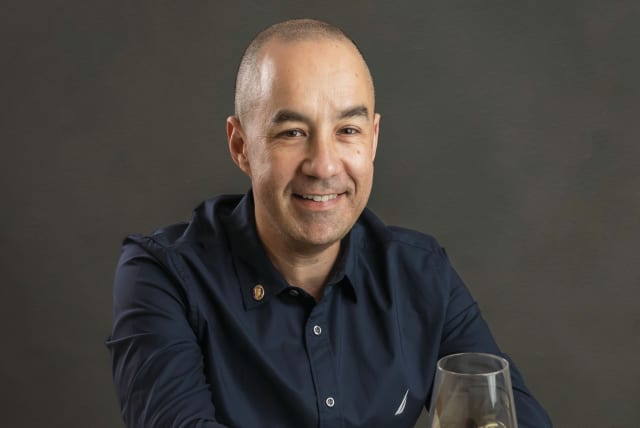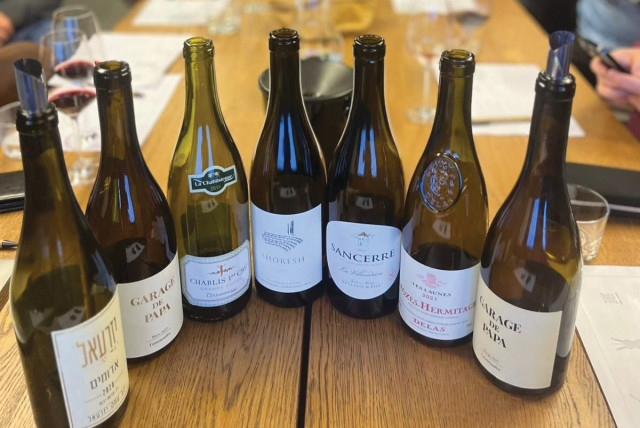Celebrating Israeli wine with Moshe Weizman's WINEing start-up

One person who has invested in his personal knowledge in international forums and has come up with an innovative concept that could go worldwide is Moshe Weizman.
One thing has become apparent since Oct. 7: We have an inordinate number of security experts. Turn on the television any time from 7 a.m. to 11 p.m. on any channel, and we see a panel full of experts spouting their theories and criticisms with absolute confidence that only they understand. In fact, the number of experts is in direct inverse proportion to the depth of the astonishing and catastrophic failures of that black Shabbat day. So many experts – but where were they when all systems failed?
Over-confidence, incompetence, and complacency were incredibly rife for a country with so many experts. I would find it amusing if it was not so desperately sad.
We are a nation that is great at talking and giving advice. I call it “Israel Football Syndrome.” Every two years, we over-talk our chances at each World or European Championships. We are led to believe this is the year. However, like the film Groundhog Day, the results are always the same (though I admit our youth soccer teams broke the mold slightly last summer, offering an example for the future).
We also suffer from the same disease in the wine industry. The activity on social media of all the self-appointed experts, the sommeliers – who are really wine waiters and Tel Aviv intelligentsia – gives us the impression that Israel is a great wine superpower. Italy and France must be trembling in their boots. We are great at looking inward and talking to ourselves.
But when you visit the large wine exhibitions and see Uruguay with a larger stand than Israel, then it gives a sense of proportion. In fact, at most wine shows there are no Israeli wineries exhibiting at all, and if there is one, it is usually the Golan Heights Winery. Turkey, Lebanon, Brazil, and Mexico have stands, but most Israeli wineries see it as an unnecessary expense. We are not quite the bee’s knees of the world’s wine trade – far from it!
Investing in Israel's wine success
This does not mean we should not celebrate success, and Israeli wine has a great deal to be proud of. One person who has invested in his personal knowledge in international forums and has come up with an innovative concept that could go worldwide is Moshe Weizman. I was pleased to meet him recently. He is an entrepreneur and sommelier from Tel Mond.
Most Israeli wine people had a wine epiphany at some stage in their past; they did not come from a wine background. In many cases, they read one of Michael Ben-Joseph’s books or took a barman’s course after the army, which led to an eventual interest in wine. I myself arrived to wine via beer.
Weizman, in contrast to most of his colleagues, was born with a silver tastevin in his mouth. He knew wine from an early age and was weaned on wine almost from birth. His parents were Francophile restaurateurs, early pioneers of French gastronomy in Israel, with an inbred drive for quality and a deep understanding of European standards of service. From this springboard, Weizman dived into hi-tech and sales, but the wine bug had bitten deep.
He scoured the country for wine courses and seemed to do them all. He started with the Wine Academy Course at Ramat Gan College (where I was a lecturer) and followed up with courses at Haim Gan’s Ish Anavim (Grape Man) and the Soreq Winery Winemaking School. This did not sate his passion to learn, so he went international. He went through the different levels of the Wine & Spirit Education Trust (WSET), the leading wine school in the world, graduating at Level 3 with merit. Still not satisfied, he then decided to study with the Court of Master Sommeliers.
MOST ISRAELIS follow the WSET wine education route, which they study at the excellent W – Wine & Spirit School in Tel Aviv. Very few follow the sommelier route. Weizman decided to because he liked the element of service and wanted to pay respect to his parents, who instilled an appreciation of wine and a respect for professional wine service in their only son.
Eventually being awarded the pin as a certified sommelier was a very good achievement by this hyper overachiever – especially as he is color blind. Color plays an important in the evaluation of wine.
No one can now say that this WSET Level 3 and certified sommelier is a self-appointed expert who pontificates but does not understand wine. These achievements gave him the skills and confidence to turn his hobby into a profession. He tied himself to Inter Shefa, a very large importing company with Russian roots, and became their sommelier.
His playground is therefore their Deli Vino in Netanya. Part wine shop, part delicatessen, part wine bar, it has a whiff of Tel Aviv style, though it is situated in Netanya in the Sharon Plain. Here, he hosts meetings, gives tutored tastings and courses, and has a home turf where he can think, dream, and experiment. Here, he cooked up ideas in the most important place: that space where the importer, retailer, and customer meet.
Weizman once visited the Annual Grand Sales Day of retailer Derech Ha’Yayin (Wine Route). He observed individuals lining up to buy “by the case” to receive the special discount on offer, and he thought of all those potential buyers who did not want to buy multiple bottles. He observed some customers frantically calling their sisters, cousins, and aunts, and messaging WhatsApp groups in order to increase the purchase so they could receive the precious discount.
He had a thought: Why not combine the buying potential of everyone, allowing individuals to obtain the discount, and retailers to considerably increase sales? He thought that if he could do this, he would be able to combine his profession and his hobby, blending together 20 years of sales experience with a deep love of wine. His idea was brilliantly conceived, breathtakingly simple, not complicated to implement and, in retrospect, quite obvious. Not for nothing is Israel the Start-Up Nation.
All that was required was a virtual, digital, or physical gathering of people. They come with the intent to make a purchase, and there are special prices on offer. Weizman thought if he could leverage these three things, he could increase turnover.
AND SO the idea of WINEing was born as a start-up by Moshe Weizman, CEO, and his partner and co-founder, Jeroen Rammerswaal, from Holland. WINEing is a digital platform enabling the buying customer to get the best possible price and the retailer or winery to maximize sales. Weizman told me that 85% of sales are those buying single bottles.
He noticed, though, that there are nearly always promotions or a special offer for those buying cases of six or 12 bottles. WINEing enables buyers who don’t know one another to join hands to ensure they receive the best price. Furthermore, a screen shows the buyers what the state of play is, so they can see in real time where the opportunities lie with each individual wine. This provides a stock exchange atmosphere with a bustle that creates further interests, encourages interaction, and adds value to the buying experience.
Great idea! So simple and obvious, but does it work? For it to take off, the wine store or winery visitors’ center must see a significant benefit. So for much of the year, Weizman has been trialing his new baby, first in Israel. Most notably was a trial supporting the Negev wineries after Oct. 7 through an online sales drive. He has followed this by trials in Italy and France.
WINEing has done 18 pilots so far at winery visitors’ centers, wine tasting workshops, wine fairs, and online. Weizman even pioneered it with a futures offer at Jezreel Valley Winery, where the buyer could also make his own blend, thus combining the best conditions for purchase with a unique wine experience. He has trialed it at Whisky Live, at Christmas fairs, and for an importer doing pre-sales.
Of course, the basic concept applies to anywhere and anything. It is particularly suitable for the drinks industry (beer and spirits, as well as wine), but the potential is way beyond that.
Weizman had confidence but no guarantee it would work. However, the test markets have shown an increase in turnover of 25%-40%. This makes it attractive to the third part of the jigsaw, the seller. So it would appear that Weizman is on to a winner.
WHEN WE talk technology in wine, we normally refer to viticulture in the vineyard or winemaking at the winery – within the gates of the winery, as it were. Outside, things have stayed the same for generations. The sales and marketing of wine are notably conservative. People coming into wine from other fields are often shocked at how backward wine marketing is. Where else, I hear you ask, would most sales still be in heavy glass bottles, where you have to buy a minimum of six glasses, and the bottles are stoppered with a bit of tree bark? Doesn’t sound very 21st century to me!
We also have severe problems in that young people worldwide are drinking far less wine. In traditional countries like France, this is very apparent. Red wine consumption is in fast decline and may even be caught up by rosé. This would have been thought to be most unlikely a generation ago. Millennials clearly want to drink differently than their parents. This crisis is as great as that of global warming to the wine trade, so technology that encourages sales and maximizes existing potential is crucial and timely.
Maybe the biggest compliment to WINEing is that it has been accepted into La WineTech. This is an exclusive club of the most advanced wine technology initiatives worldwide. It is the hub and laboratory of all the exciting initiatives being hatched to shake up the wine world.
Moshe Weizman is sharp, bright and pushy, all wrapped up in European worldliness and manners – like an iron fist wrapped in a velvet glove. A long-distance runner, he has the belief and drive to succeed – and I think he will.
The writer is a winery veteran turned wine writer, who has advanced Israeli wine for 35 years. He is referred to as “the English voice of Israeli wine.” www.adammontefiore.com
Jerusalem Post Store
`; document.getElementById("linkPremium").innerHTML = cont; var divWithLink = document.getElementById("premium-link"); if (divWithLink !== null && divWithLink !== 'undefined') { divWithLink.style.border = "solid 1px #cb0f3e"; divWithLink.style.textAlign = "center"; divWithLink.style.marginBottom = "15px"; divWithLink.style.marginTop = "15px"; divWithLink.style.width = "100%"; divWithLink.style.backgroundColor = "#122952"; divWithLink.style.color = "#ffffff"; divWithLink.style.lineHeight = "1.5"; } } (function (v, i) { });

